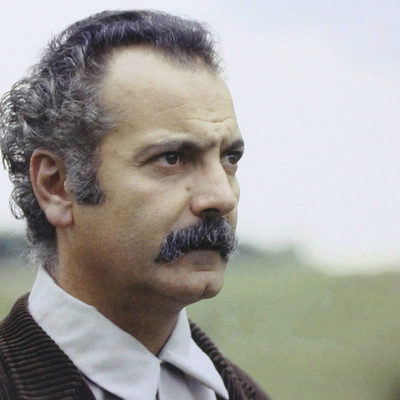在法国曾有以他名字命名的公园,曾有着2000万张发行量的歌唱家兼作曲家,他的作品如诗歌般使得他也有了诗人的称号。而他的歌曲多以纯风琴,木琴与吉他来伴奏,给人纯正的法国风味。
初听他的歌曲的时候,会觉得他歌曲中的咬字非常不同与原先印象中的chanson,后来才明白,同是具有诗人身份的Georges Brassens,在歌词中用上了诗歌般的语言,才会让他的歌曲听上去有着抑扬顿挫的感觉,特别是那些小舌音忽有忽无,又千丝万缕粘连的感觉。成名曲《Chanson pour l'Auvergnat》是写在1955年的,翻译过来的名字应该是“奥佛涅之歌”。
Georges Brassens (22 October 1921 – 29 October 1981) was a French singer-songwriter and poet.
He wrote and sang, with his guitar, more than a hundred of his poems, as well as texts from many others such as Victor Hugo, Paul Verlaine, or Louis Aragon. In 1967, he received the Grand Prix de Poésie of the Académie française.
Between 1952 and 1976, he recorded fourteen albums that include several popular French songs such as Les copains d'abord, Chanson pour l'Auvergnat, La mauvaise réputation, and Mourir pour des idées. Most of his texts are black humour-tinged and often anarchist-minded.
Brassens was born in the town of Sète, a town in southern France near Montpellier. Now an iconic figure in France, he achieved fame through his elegant songs with their harmonically complex music for voice and guitar and articulate, diverse lyrics; indeed, he is considered one of France's most accomplished postwar poets. He has also set to music poems by both well-known and relatively obscure poets, including Louis Aragon (Il n'y a pas d'amour heureux), Victor Hugo (La Légende de la Nonne, Gastibelza), Jean Richepin, Fran?ois Villon (La Ballade des Dames du Temps Jadis), and Antoine Pol (Les Passantes).
During World War II, he was forced by the Germans to work in a labor camp at a BMW aircraft engine plant in Basdorf near Berlin in Germany (March 1943). Here Brassens met some of his future friends, such as Pierre Onténiente, whom he called Gibraltar because he was "steady as a rock." They would later become close friends.
After being given ten days' leave in France, he decided not to return to the labour camp. Brassens took refuge in a small cul-de-sac called "Impasse Florimont," in the 14th arrondissement of Paris, a popular and working class district, where he lived for several years with its owner, Jeanne Planche, a friend of his aunt. Planche lived with her husband Marcel in relative poverty: without gas, running water, or electricity. Brassens remained hidden there until the end of the war five months later, but ended up staying for 22 years. Planche was the inspiration for Brassens's song Jeanne.
Apart from Paris and Sète, he lived first in Crespières (near Paris) and latterly in Lezardrieux (Brittany).
在法国曾有以他名字命名的公园,曾有着2000万张发行量的歌唱家兼作曲家,他的作品如诗歌般使得他也有了诗人的称号。而他的歌曲多以纯风琴,木琴与吉他来伴奏,给人纯正的法国风味。
初听他的歌曲的时候,会觉得他歌曲中的咬字非常不同与原先印象中的chanson,后来才明白,同是具有诗人身份的Georges Brassens,在歌词中用上了诗歌般的语言,才会让他的歌曲听上去有着抑扬顿挫的感觉,特别是那些小舌音忽有忽无,又千丝万缕粘连的感觉。成名曲《Chanson pour l'Auvergnat》是写在1955年的,翻译过来的名字应该是“奥佛涅之歌”。
Georges Brassens (22 October 1921 – 29 October 1981) was a French singer-songwriter and poet.
He wrote and sang, with his guitar, more than a hundred of his poems, as well as texts from many others such as Victor Hugo, Paul Verlaine, or Louis Aragon. In 1967, he received the Grand Prix de Poésie of the Académie française.
Between 1952 and 1976, he recorded fourteen albums that include several popular French songs such as Les copains d'abord, Chanson pour l'Auvergnat, La mauvaise réputation, and Mourir pour des idées. Most of his texts are black humour-tinged and often anarchist-minded.
Brassens was born in the town of Sète, a town in southern France near Montpellier. Now an iconic figure in France, he achieved fame through his elegant songs with their harmonically complex music for voice and guitar and articulate, diverse lyrics; indeed, he is considered one of France's most accomplished postwar poets. He has also set to music poems by both well-known and relatively obscure poets, including Louis Aragon (Il n'y a pas d'amour heureux), Victor Hugo (La Légende de la Nonne, Gastibelza), Jean Richepin, Fran?ois Villon (La Ballade des Dames du Temps Jadis), and Antoine Pol (Les Passantes).
During World War II, he was forced by the Germans to work in a labor camp at a BMW aircraft engine plant in Basdorf near Berlin in Germany (March 1943). Here Brassens met some of his future friends, such as Pierre Onténiente, whom he called Gibraltar because he was "steady as a rock." They would later become close friends.
After being given ten days' leave in France, he decided not to return to the labour camp. Brassens took refuge in a small cul-de-sac called "Impasse Florimont," in the 14th arrondissement of Paris, a popular and working class district, where he lived for several years with its owner, Jeanne Planche, a friend of his aunt. Planche lived with her husband Marcel in relative poverty: without gas, running water, or electricity. Brassens remained hidden there until the end of the war five months later, but ended up staying for 22 years. Planche was the inspiration for Brassens's song Jeanne.
Apart from Paris and Sète, he lived first in Crespières (near Paris) and latterly in Lezardrieux (Brittany).
